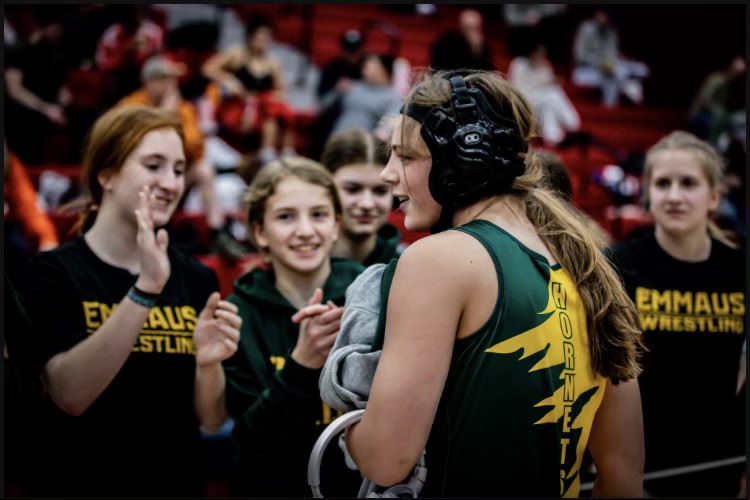Nearing the end of the 2023-24 school year, behind the charades of the end-of-the-year excitement, East Penn School District teachers banded together to begin a multi-month-long contract negotiation: one that would dictate the next four years of EPSD staff.
The East Penn School District works alongside a labor union called the East Penn Education Association (EPEA), which encompasses around 600 EPSD teachers and staff, to form a contract that needs to be renewed every three to five years. The previous standing contract was set to expire in June of this year, which meant negotiations for creating a new contract began a few months prior.
As teachers gathered to defend their rights, they could be seen sporting custom pins that read, “A fair contract makes us #EASTPENNPROUD.” This was more than a demand for higher wages — it was a call for recognition, respect, and the value of their hard work in shaping future generations.
For months, the EPEA engaged in tense debates, each side vying for a solution yet seemingly worlds apart. Despite the grueling negotiations, the board approved a new four-year contract on August 26, the first day of the new school year.
An original staff contract was proposed; however, it was struck down in a vote (367-11) against the agreement. The EPEA claimed it did not address two of the union’s vital concerns: fair working conditions for staff and a fairer salary that reflects other local districts. The newly approved contract addresses the pay disparity between the EPSD and surrounding districts.
“It doesn’t address improvements in working conditions, and it doesn’t provide commensurate compensation,” EPEA Chief Negotiator and Emmaus High School math teacher Christopher Ritter stated at the July 8 school board meeting regarding the struck-down contract proposal.
Labor unions work to ensure that the employees of a particular company, field, or, in this case, school district, receive fair pay, time off, health coverage, and other employment benefits. The EPEA negotiates for equitable collective bargaining agreements, informally known as contracts.
“We took a pay freeze in 2020 during the pandemic, and a lot of other districts around us didn’t do that, and that kind of put us behind them in terms of salary,” Ritter said.
Dr. William Whitney, a current EPSD school board member, explained how the negotiation process can be elongated and tedious. Due to continued disagreement on specific issues, including overall salaries, length of the school day, and extra pay for teachers with additional duties, the signing process took longer than expected. This left EPSD staff to work under no contract throughout the summer, which is typically advised against.
“All collective bargaining negotiations, in East Penn or anywhere else, are, by their nature, conflicting,” Whitney said. “It’s a long but important process of going back and forth, bit by bit until both sides can reach an agreement, and both sides inevitably have to give up some of what they want for that to happen.”
The interim between the previous contract’s expiration and the creation of the 2024-28 contract was in the middle of the summer, a critical period for the pre-season of fall sports.
“In this case, the importance of reaching a fair, competitive, and equitable agreement that both sides could accept meant that negotiations needed longer than usual,” Whitney said.
Due to the lack of an active contract and the minimal progress made over the summer, many summer extracurricular activities were stalled to prevent teachers from working without a contract.
“My understanding is that there were some training sessions and practices during the month of July which the EPEA asked their members to cancel because, at that time, they were officially working without a contract in place,” Whitney said.
Whether or not teachers continued to show up for extracurricular activities was up to their discretion; however, a majority of teachers stuck to only their contracted hours as a sign of resilience for equity amongst teachers.
EHS varsity football center Connor Soos, amongst many others, dealt with the challenge of having practice cut short.
“[Hold-ups in renewing a contract] affected our summer practices,” Soos said. “There was a time and point when we had zero communication with any of our coaches, and our only coach was our strength and conditioning coach.”
Despite the challenges of practicing without a coach, Soos believes the team recovered when the contract disputes were resolved, and the coaches were back. The team knew what it needed to do to get where it wanted to be for the upcoming season.
“We kind of had to play a little bit of catch-up, but the coaches were very open in knowing that we had a lot of work to make up,” Soos said. “I feel like we’re at a good spot this year where I don’t even think about that moment anymore because I feel so prepared by the coaches.”
Though navigating this unpredictable era was hard on many student-athletes, the challenges that arose due to the EPEA turmoil ended with the contract’s confirmation, beginning the 2024-25 school year on a positive note.
“As a board member, of course, I’m grateful to my board colleagues and the district administrators who saw this process through to a successful conclusion, and I’m beyond grateful for, and proud of, our East Penn teachers who are second to none, and who I hope understand and feel how valued they are by the district,” Whitney said.







